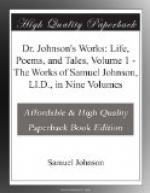But, while we thus pronounce Johnson’s failure in the production of dramatic effect, we will not withhold our tribute of admiration from Irene, as a moral piece. For, although a remark of Fox’s on an unpublished tragedy of Burke’s, that it was rather rhetorical than poetical, may be applied to the work under consideration; still it abounds, throughout, with the most elevated and dignified lessons of morality and virtue. The address of Demetrius to the aged Cali, on the dangers of procrastination[e]; Aspasia’s reprobation of Irene’s meditated apostasy[f]; and the allusive panegyric on the British constitution[g], may be enumerated, as examples of its excellence in sentiment and diction.
Lastly, we may consider Irene, as one other illustrious proof, that the most strict adherence to the far-famed unities, the most harmonious versification, and the most correct philosophy, will not vie with a single and simple touch of nature, expressed in simple and artless language. “But how rich in reputation must that author be, who can spare an Irene, and not feel the loss [h].”
FOOTNOTES [a] Rambler, No. 24, and note. [b] Boswell’s
Life, i. [c] Murphy’s Essay on the Life and
Genius of Dr. Johnson. [d] Prologue at the opening
of Drury lane theatre, 1747. [e] Act iii. scene ii.
“To-morrow’s action!” &c. [f] Act
iii. scene viii. “Reflect, that life and
death,” &c. [g] Act i. scene ii. “If
there be any land, as fame reports,” &c. [h]
Dr. Young’s remark on Addison’s Cato.
See his Conjectures on
Original Composition.
Works, vol. v.
PROLOGUE.
Ye glitt’ring train, whom lace and velvet bless,
Suspend the soft solicitudes of dress!
From grov’ling bus’ness and superfluous
care,
Ye sons of avarice, a moment spare!
Vot’ries of fame, and worshippers of power,
Dismiss the pleasing phantoms for an hour!
Our daring bard, with spirit unconfin’d,
Spreads wide the mighty moral for mankind.
Learn here, how heaven supports the virtuous mind,
Daring, though calm; and vig’rous, though resign’d;
Learn here, what anguish racks the guilty breast,
In pow’r dependant, in success depress’d.
Learn here, that peace from innocence must flow;
All else is empty sound, and idle show.




